Unit7 Will people have robots? Section A 1a-3b 知识点串讲课件(共14张PPT)
文档属性
| 名称 | Unit7 Will people have robots? Section A 1a-3b 知识点串讲课件(共14张PPT) | 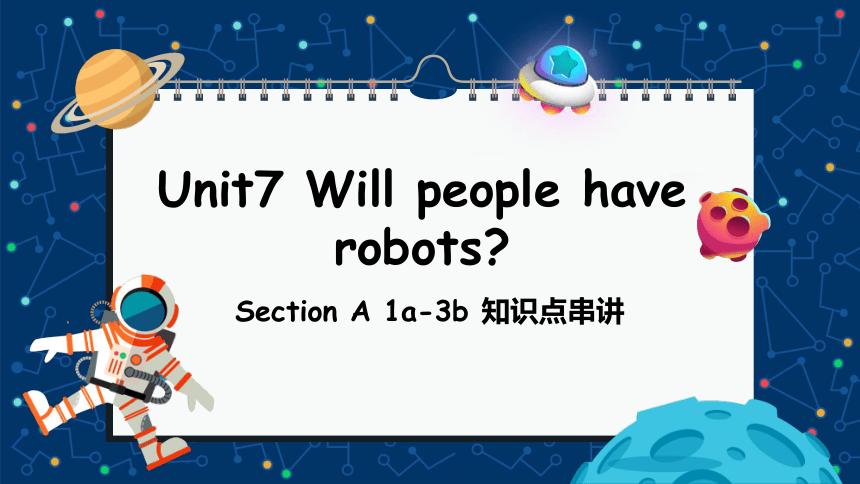 | |
| 格式 | zip | ||
| 文件大小 | 943.6KB | ||
| 资源类型 | 教案 | ||
| 版本资源 | 人教新目标(Go for it)版 | ||
| 科目 | 英语 | ||
| 更新时间 | 2022-10-10 15:34:53 | ||
图片预览

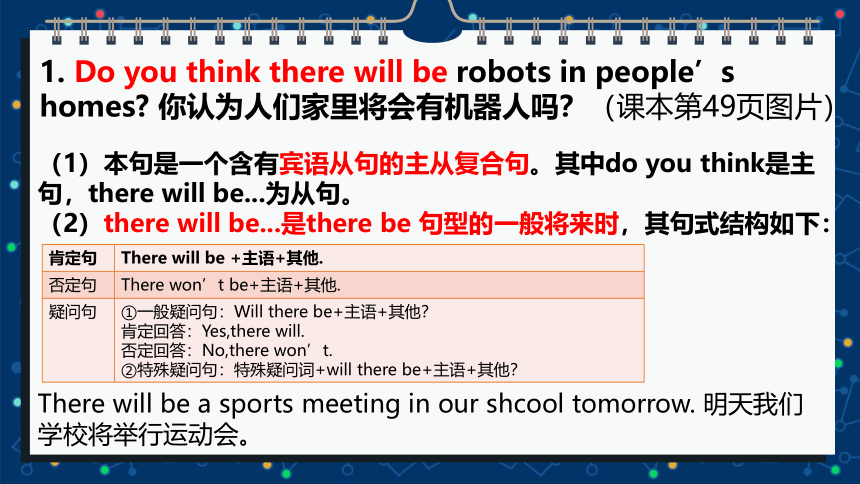
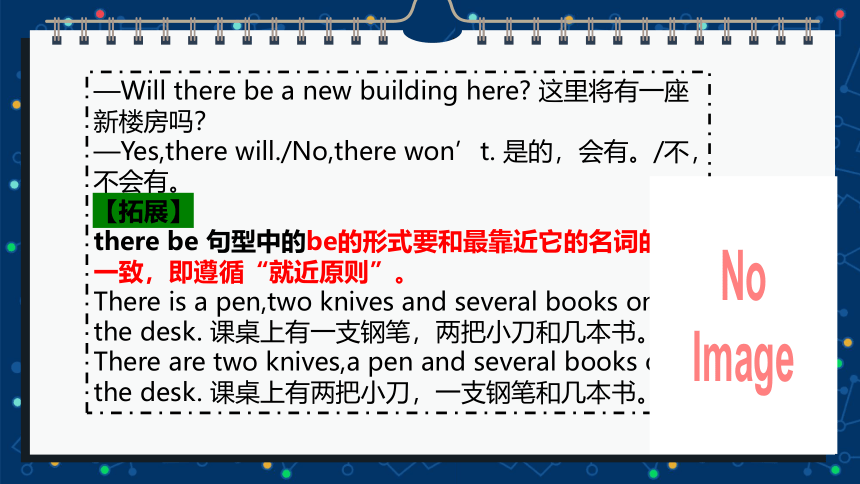
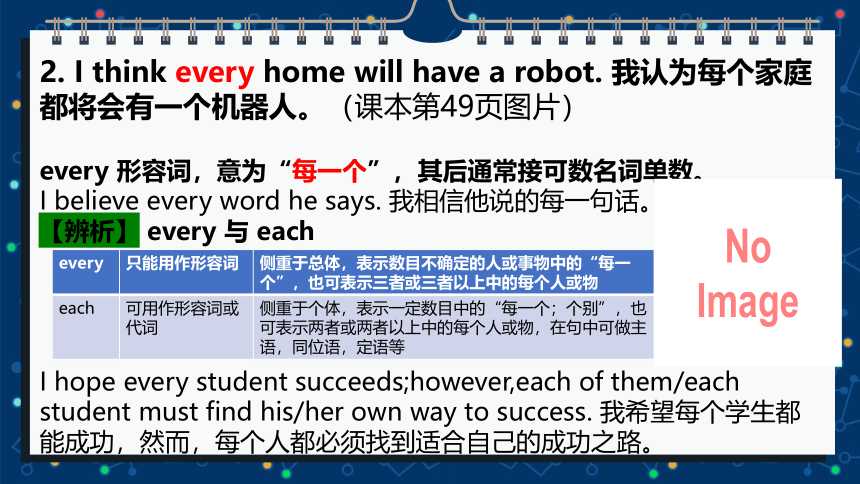
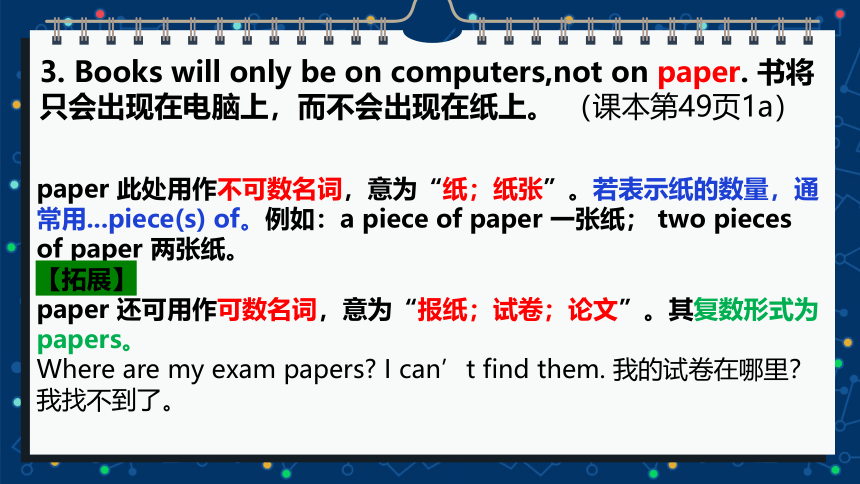
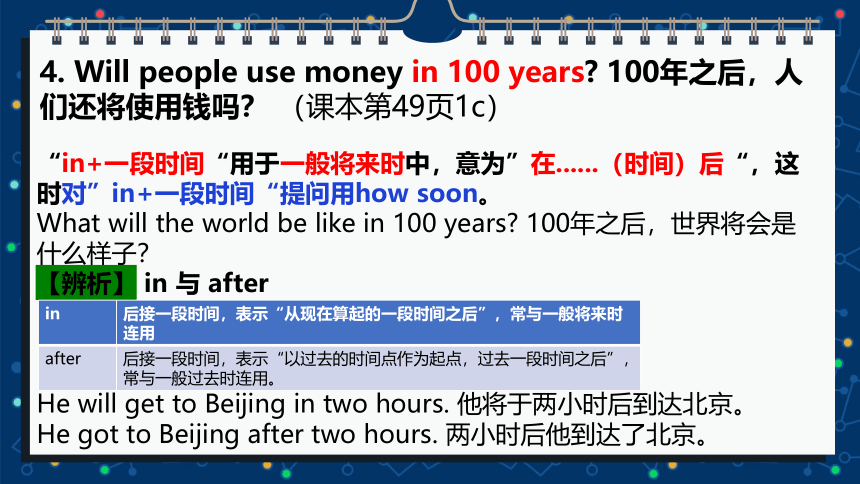
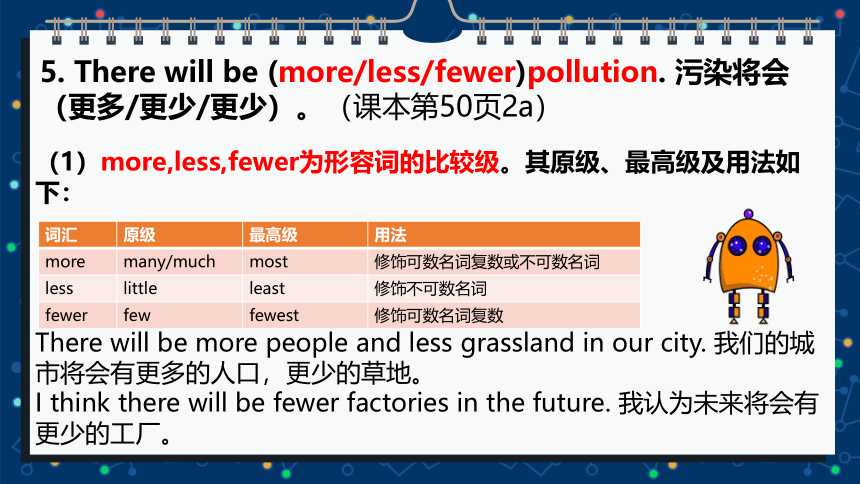
文档简介
(共14张PPT)
Unit7 Will people have robots
Section A 1a-3b 知识点串讲
1. Do you think there will be robots in people’s homes 你认为人们家里将会有机器人吗?(课本第49页图片)
(1)本句是一个含有宾语从句的主从复合句。其中do you think是主句,there will be...为从句。
(2)there will be...是there be 句型的一般将来时,其句式结构如下:
There will be a sports meeting in our shcool tomorrow. 明天我们学校将举行运动会。
肯定句 There will be +主语+其他.
否定句 There won’t be+主语+其他.
疑问句 ①一般疑问句:Will there be+主语+其他?
肯定回答:Yes,there will.
否定回答:No,there won’t.
②特殊疑问句:特殊疑问词+will there be+主语+其他?
—Will there be a new building here 这里将有一座新楼房吗?
—Yes,there will./No,there won’t. 是的,会有。/不,不会有。
【拓展】
there be 句型中的be的形式要和最靠近它的名词的数一致,即遵循“就近原则”。
There is a pen,two knives and several books on the desk. 课桌上有一支钢笔,两把小刀和几本书。
There are two knives,a pen and several books on the desk. 课桌上有两把小刀,一支钢笔和几本书。
2. I think every home will have a robot. 我认为每个家庭都将会有一个机器人。(课本第49页图片)
every 形容词,意为“每一个”,其后通常接可数名词单数。
I believe every word he says. 我相信他说的每一句话。
【辨析】 every 与 each
I hope every student succeeds;however,each of them/each student must find his/her own way to success. 我希望每个学生都能成功,然而,每个人都必须找到适合自己的成功之路。
every 只能用作形容词 侧重于总体,表示数目不确定的人或事物中的“每一个”,也可表示三者或三者以上中的每个人或物
each 可用作形容词或代词 侧重于个体,表示一定数目中的“每一个;个别”,也可表示两者或两者以上中的每个人或物,在句中可做主语,同位语,定语等
3. Books will only be on computers,not on paper. 书将只会出现在电脑上,而不会出现在纸上。 (课本第49页1a)
paper 此处用作不可数名词,意为“纸;纸张”。若表示纸的数量,通常用...piece(s) of。例如:a piece of paper 一张纸; two pieces of paper 两张纸。
【拓展】
paper 还可用作可数名词,意为“报纸;试卷;论文”。其复数形式为papers。
Where are my exam papers I can’t find them. 我的试卷在哪里? 我找不到了。
4. Will people use money in 100 years 100年之后,人们还将使用钱吗? (课本第49页1c)
“in+一段时间“用于一般将来时中,意为”在......(时间)后“,这时对”in+一段时间“提问用how soon。
What will the world be like in 100 years 100年之后,世界将会是什么样子?
【辨析】 in 与 after
He will get to Beijing in two hours. 他将于两小时后到达北京。
He got to Beijing after two hours. 两小时后他到达了北京。
in 后接一段时间,表示“从现在算起的一段时间之后”,常与一般将来时连用
after 后接一段时间,表示“以过去的时间点作为起点,过去一段时间之后”,常与一般过去时连用。
5. There will be (more/less/fewer)pollution. 污染将会(更多/更少/更少)。(课本第50页2a)
(1)more,less,fewer为形容词的比较级。其原级、最高级及用法如下:
There will be more people and less grassland in our city. 我们的城市将会有更多的人口,更少的草地。
I think there will be fewer factories in the future. 我认为未来将会有更少的工厂。
词汇 原级 最高级 用法
more many/much most 修饰可数名词复数或不可数名词
less little least 修饰不可数名词
fewer few fewest 修饰可数名词复数
(2)pollution 为不可数名词,意为“污染;污染物”。常见名词短语:air pollution 空气污染; water pollution 水污染; noise pollution 噪声污染。
其动词形式为pollute,意为“污染”。
There is a lot of pollution now,such as air pollution and water pollution because many things are polluting our air and water. 现在有很多污染,如空气污染,水污染,这是因为有很
多东西正在污染我们的空气和水。
6. What’s your prediction about the future 对于未来,你有何预言? (课本第50页2c)
future名词,意为“未来;将来”。
I am saving for the future. 我正在为将来存钱。
【辨析】 in future 与 in the future
Don’t do that in future. 以后别做那种事了。
Who knows what will happen in the future 谁知道将来会发生什么事呢?
in future 意为“今后;以后”,常指离现在较近的一段将来时间,包括现在,相当于from now on
in the future 意为“将来”,指距离现在较远的一段将来时间,不包括现在
7. I don’t think so. 我不这样认为。(课本第50页2c)
“I don’t think so.”是英语口语中常用的一个短句,用来否定对方的意见或观点。其肯定形式为”I think so.”。其中,so为副词,代替上文所说的内容,以使语句简练。
—Do you think it will rain 你认为会下雨吗?
—Yes,I think so. / No,I don’t think so. 是的,我想会。/不,我想不会。
【拓展】
除think之外,so还常与hope,believe,guess等词搭配。
—Do you think Chinese team will win 你认为中国队会赢吗?
—I hope so! 我希望会赢!
8.We can use less water and plant more trees. 我们可以少用水,多植树。(课本第50页2d)
plant 此处用作动词,意为“种植;栽种“。
Spring id the season to plant trees. 春天是种树的季节。
【辨析】 plant 与 grow
We planted some roses. 我们栽了一些玫瑰。
The farmer grows potatoes in this field. 这个农民在这块地里种土豆。
plant 意为“种植”,常指移植已长成秧苗的植物,是一种涉及时间较短的活动
grow 意为“栽培;生长”,常指使某种植物从种子开始的生长过程,涉及时间较长
9.Everyone should play a part in saving the earth. 每个人都应当尽一份力来拯救地球。(课本第50页2d)
play a part 在此句中意为“参与;发挥作用”,还可意为“扮演角色”,常与介词in搭配,构成play a part in ,其后可接名词,代词或动词-ing形式。此外,part前可用形容词修饰。
Computers are playing an important part in our daily life. 电脑在我们日常生活中发挥着重要作用。
【拓展】
固定短语take part in 也表示“参加”,但part前无限定词。
Many cities took part in Earth Hour. 许多城市参加了“地球一小时”活动。
10.I sometimes see blue skies in my city,but in the future...我有时看得到(我的)城市里的蓝天,但是在未来...(课本第51页3b)
sky 名词,意为“天空”。在本句中,sky用作复数,表示天气或某地的天空看上去怎样。
You can see a clear sky more clearly in such weather. 这种天气里你能更容易看到一片晴空。
【拓展】
当只指“天空”时,sky通常用单数形式,常构成短语in the
sky “在天空中”。
Look! There are many kites in the sky. 看!填上有许多风筝。
Thank you
Unit7 Will people have robots
Section A 1a-3b 知识点串讲
1. Do you think there will be robots in people’s homes 你认为人们家里将会有机器人吗?(课本第49页图片)
(1)本句是一个含有宾语从句的主从复合句。其中do you think是主句,there will be...为从句。
(2)there will be...是there be 句型的一般将来时,其句式结构如下:
There will be a sports meeting in our shcool tomorrow. 明天我们学校将举行运动会。
肯定句 There will be +主语+其他.
否定句 There won’t be+主语+其他.
疑问句 ①一般疑问句:Will there be+主语+其他?
肯定回答:Yes,there will.
否定回答:No,there won’t.
②特殊疑问句:特殊疑问词+will there be+主语+其他?
—Will there be a new building here 这里将有一座新楼房吗?
—Yes,there will./No,there won’t. 是的,会有。/不,不会有。
【拓展】
there be 句型中的be的形式要和最靠近它的名词的数一致,即遵循“就近原则”。
There is a pen,two knives and several books on the desk. 课桌上有一支钢笔,两把小刀和几本书。
There are two knives,a pen and several books on the desk. 课桌上有两把小刀,一支钢笔和几本书。
2. I think every home will have a robot. 我认为每个家庭都将会有一个机器人。(课本第49页图片)
every 形容词,意为“每一个”,其后通常接可数名词单数。
I believe every word he says. 我相信他说的每一句话。
【辨析】 every 与 each
I hope every student succeeds;however,each of them/each student must find his/her own way to success. 我希望每个学生都能成功,然而,每个人都必须找到适合自己的成功之路。
every 只能用作形容词 侧重于总体,表示数目不确定的人或事物中的“每一个”,也可表示三者或三者以上中的每个人或物
each 可用作形容词或代词 侧重于个体,表示一定数目中的“每一个;个别”,也可表示两者或两者以上中的每个人或物,在句中可做主语,同位语,定语等
3. Books will only be on computers,not on paper. 书将只会出现在电脑上,而不会出现在纸上。 (课本第49页1a)
paper 此处用作不可数名词,意为“纸;纸张”。若表示纸的数量,通常用...piece(s) of。例如:a piece of paper 一张纸; two pieces of paper 两张纸。
【拓展】
paper 还可用作可数名词,意为“报纸;试卷;论文”。其复数形式为papers。
Where are my exam papers I can’t find them. 我的试卷在哪里? 我找不到了。
4. Will people use money in 100 years 100年之后,人们还将使用钱吗? (课本第49页1c)
“in+一段时间“用于一般将来时中,意为”在......(时间)后“,这时对”in+一段时间“提问用how soon。
What will the world be like in 100 years 100年之后,世界将会是什么样子?
【辨析】 in 与 after
He will get to Beijing in two hours. 他将于两小时后到达北京。
He got to Beijing after two hours. 两小时后他到达了北京。
in 后接一段时间,表示“从现在算起的一段时间之后”,常与一般将来时连用
after 后接一段时间,表示“以过去的时间点作为起点,过去一段时间之后”,常与一般过去时连用。
5. There will be (more/less/fewer)pollution. 污染将会(更多/更少/更少)。(课本第50页2a)
(1)more,less,fewer为形容词的比较级。其原级、最高级及用法如下:
There will be more people and less grassland in our city. 我们的城市将会有更多的人口,更少的草地。
I think there will be fewer factories in the future. 我认为未来将会有更少的工厂。
词汇 原级 最高级 用法
more many/much most 修饰可数名词复数或不可数名词
less little least 修饰不可数名词
fewer few fewest 修饰可数名词复数
(2)pollution 为不可数名词,意为“污染;污染物”。常见名词短语:air pollution 空气污染; water pollution 水污染; noise pollution 噪声污染。
其动词形式为pollute,意为“污染”。
There is a lot of pollution now,such as air pollution and water pollution because many things are polluting our air and water. 现在有很多污染,如空气污染,水污染,这是因为有很
多东西正在污染我们的空气和水。
6. What’s your prediction about the future 对于未来,你有何预言? (课本第50页2c)
future名词,意为“未来;将来”。
I am saving for the future. 我正在为将来存钱。
【辨析】 in future 与 in the future
Don’t do that in future. 以后别做那种事了。
Who knows what will happen in the future 谁知道将来会发生什么事呢?
in future 意为“今后;以后”,常指离现在较近的一段将来时间,包括现在,相当于from now on
in the future 意为“将来”,指距离现在较远的一段将来时间,不包括现在
7. I don’t think so. 我不这样认为。(课本第50页2c)
“I don’t think so.”是英语口语中常用的一个短句,用来否定对方的意见或观点。其肯定形式为”I think so.”。其中,so为副词,代替上文所说的内容,以使语句简练。
—Do you think it will rain 你认为会下雨吗?
—Yes,I think so. / No,I don’t think so. 是的,我想会。/不,我想不会。
【拓展】
除think之外,so还常与hope,believe,guess等词搭配。
—Do you think Chinese team will win 你认为中国队会赢吗?
—I hope so! 我希望会赢!
8.We can use less water and plant more trees. 我们可以少用水,多植树。(课本第50页2d)
plant 此处用作动词,意为“种植;栽种“。
Spring id the season to plant trees. 春天是种树的季节。
【辨析】 plant 与 grow
We planted some roses. 我们栽了一些玫瑰。
The farmer grows potatoes in this field. 这个农民在这块地里种土豆。
plant 意为“种植”,常指移植已长成秧苗的植物,是一种涉及时间较短的活动
grow 意为“栽培;生长”,常指使某种植物从种子开始的生长过程,涉及时间较长
9.Everyone should play a part in saving the earth. 每个人都应当尽一份力来拯救地球。(课本第50页2d)
play a part 在此句中意为“参与;发挥作用”,还可意为“扮演角色”,常与介词in搭配,构成play a part in ,其后可接名词,代词或动词-ing形式。此外,part前可用形容词修饰。
Computers are playing an important part in our daily life. 电脑在我们日常生活中发挥着重要作用。
【拓展】
固定短语take part in 也表示“参加”,但part前无限定词。
Many cities took part in Earth Hour. 许多城市参加了“地球一小时”活动。
10.I sometimes see blue skies in my city,but in the future...我有时看得到(我的)城市里的蓝天,但是在未来...(课本第51页3b)
sky 名词,意为“天空”。在本句中,sky用作复数,表示天气或某地的天空看上去怎样。
You can see a clear sky more clearly in such weather. 这种天气里你能更容易看到一片晴空。
【拓展】
当只指“天空”时,sky通常用单数形式,常构成短语in the
sky “在天空中”。
Look! There are many kites in the sky. 看!填上有许多风筝。
Thank you
同课章节目录
- Unit 1 Where did you go on vacation?
- Section A
- Section B
- Unit 2 How often do you exercise?
- Section A
- Section B
- Unit 3 I'm more outgoing than my sister.
- Section A
- Section B
- Unit 4 What's the best movie theater?
- Section A
- Section B
- Unit 5 Do you want to watch a game show?
- Section A
- Section B
- Unit 6 I'm going to study computer science.
- Section A
- Section B
- Unit 7 Will people have robots?
- Section A
- Section B
- Unit 8 How do you make a banana milk shake?
- Section A
- Section B
- Unit 9 Can you come to my party?
- Section A
- Section B
- Unit 10 If you go to the party, you'll have a grea
- Section A
- Section B
